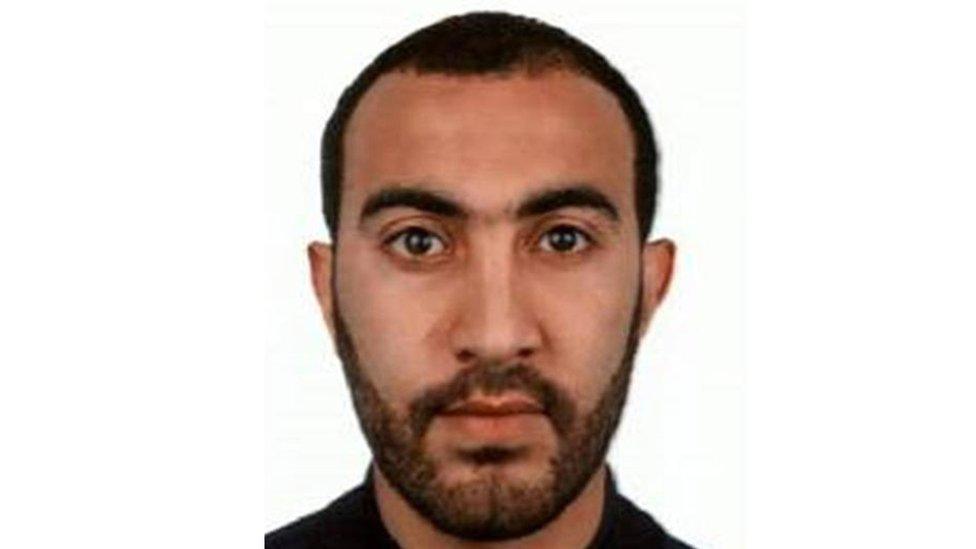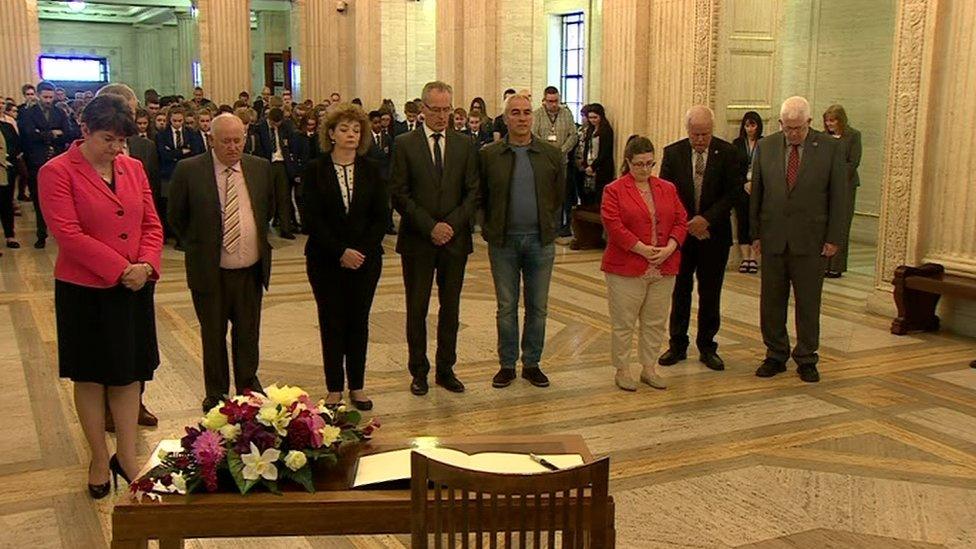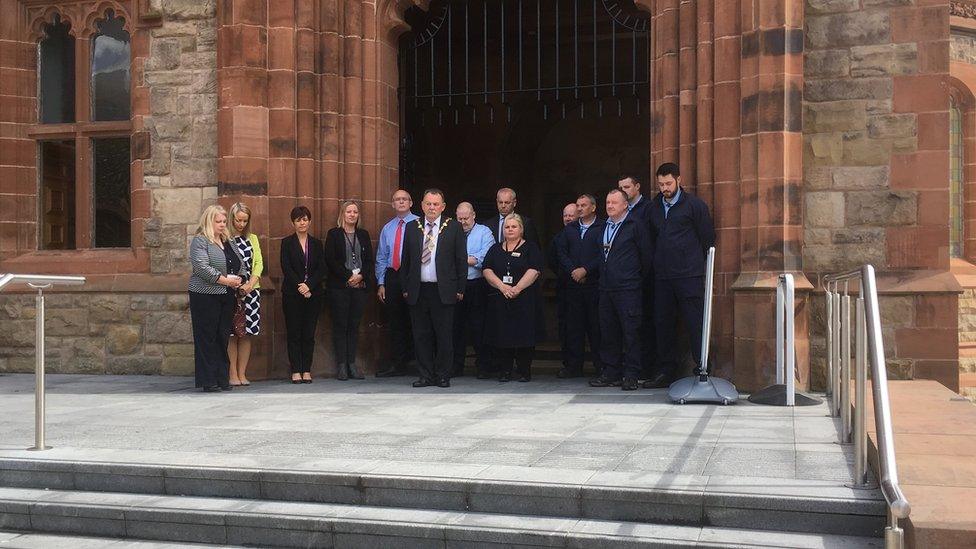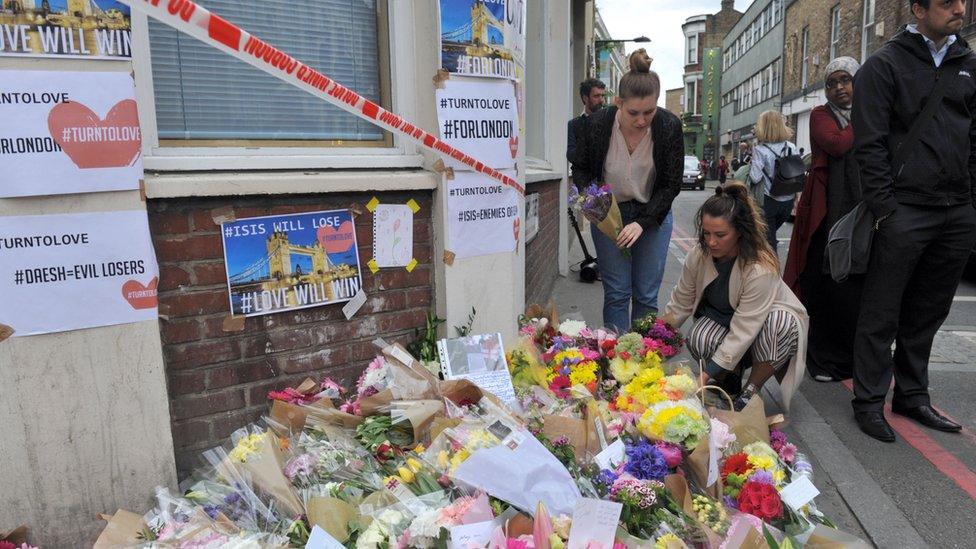London attacker 'lived in Dublin but was not monitored'
- Published

Rachid Redouane had lived in Dublin but was not being monitored by Irish police
Irish police are investigating the background of one of the London Bridge attackers after documentation showed he spent some time in the Republic of Ireland.
Rachid Redouane has been named as one of three men who carried out the attack on London Bridge on Saturday.
Police say he is of Moroccan and Libyan descent.
Redouane is understood to have been carrying an Irish identification card when he was shot dead.
The attack in London was the third terror attack in the UK in three months, following the car and knife attack on Westminster Bridge in March, in which five people were killed, and the Manchester bombing on 22 May, in which 22 people were killed.
It has been established that Redouane, who was a chef, had lived for a time in south Dublin, and also used the name Rachid Elkhdar. He had not been known to police in the UK or in Ireland.
Irish broadcaster RTÉ reports that 30-year-old Redouane married a British woman in Ireland in 2012 before moving back to the UK.
RTÉ also understands the couple returned to Ireland for a short time in 2016 before separating.

Politicians stand for a minute's silence to remember the victims of the London attack in Stormont's Great Hall
An Garda Síochána (Irish police) detectives suspect he may have been married to a 38-year-old woman who was taken into custody in the UK.
Police arrested 12 people in the aftermath of the attack; all have been released without charge.
Outgoing Taoiseach (Irish Prime Minister) Enda Kenny said the man was not one of a small number of people in Ireland being monitored by authorities "in respect of radicalisation".
Speaking in Chicago, Mr Kenny said that under European Union treaties, Ireland grants working visas to people from outside the EU who are in a relationship with an EU citizen.
That appeared to have been the case regarding Redouane, although this was being checked, added Mr Kenny.
Irish attack 'possible'
While he said the common travel area was important and should be retained, the taoiseach said there was daily and sometimes hourly contact between the Irish authorities and their counterparts in Britain and Europe.
After the Manchester bombing, Mr Kenny said he called a meeting of various groups including the Garda Commissioner, the Chief of Staff of the (Irish) Defence Forces and officials involved in health, transport and aviation.

The newly elected mayor of Derry City and Strabane District Council Maoliosa McHugh led a minute's silence in Guildhall Square to the victims
"There was a full review of Ireland's readiness" under way, he added.
The threat assessment level in Ireland at the moment is "moderate", meaning an attack is possible but unlikely.
The Irish Department of Justice said: "The level of threat from this source is kept under constant and active review by An Garda Síochána.
"The commissioner makes an assessment based on a range of factors including current available intelligence, knowledge of capabilities, events outside the State and the current international climate."
Immigration warning
Dr Umar al Qadri, of the Irish Muslim Peace and Integration council, told RTE he had warned the authorities two years ago, that there were extremists in Ireland.
"I know a number of other individuals, who are still living in Ireland, that are spreading their hatreds, spreading their hate narratives, on social media as well as off-line," he said.
Suspected extremists should be monitored by the justice department, he said, but this was not enough.

Floral tributes have been building up at a number of locations around the scene of the attack
"I think these people need professional help, they need to be de-radicalised," he said.
Redouane's Irish identification has raised questions about the country's immigration controls.
In December 2016, the head of the police in Northern Ireland told Westminster's NI Affairs Committee: "Immigration controls into the Republic of Ireland may not have the same resource and focus that we would be seeing in Northern Ireland."
PSNI Chief Constable George Hamilton was giving evidence on the future of the Irish border after Brexit.
Mr Hamilton said there was good co-operation and exchange of information between the PSNI and the Irish authorities.

But he added that access to the Republic of Ireland might not have "the immigration checks that we would have in Northern Ireland or, indeed, more broadly in the United Kingdom."
Meanwhile, specially trained officers from the PSNI have been involved in providing help to police colleagues dealing with the attacks in both Manchester and London.
Following the terrorist incident in London, 10 police officers supported the Metropolitan Police on the dedicated helpline by taking calls from concerned members of the public.
After the bomb at the Manchester concert on 22 May, four of the PSNI's hostage and crisis negotiators travelled to the city to help officers in Greater Manchester Police with their investigation and arrest operations over three days.
Among other developments:
There was a minute's silence on Tuesday at 11:00 BST in memory of those who lost their lives and all those affected by the attacks
Barriers have been installed on Westminster, Lambeth and Waterloo bridges following the attack to stop vehicles from mounting the pavement
The Independent Police Complaints Commission said 46 shots had been fired at the three attackers by eight police officers - three from the City of London force and five from the Met
The Met Police has set up a casualty bureau on 0800 096 1233 and 020 7158 0197 for people concerned about friends or relatives.